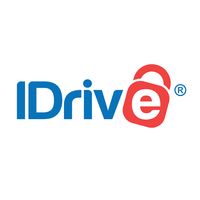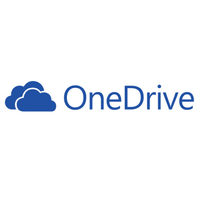Many of the best personal cloud storage services include end-to-end encryption as well as file syncing solutions such as file versioning and retention. These features help keep your data safe while also allowing you to see when changes were last made to a file. Being able to access your most important files from anywhere with an internet connection is a huge plus and one of the reasons many opt to store their files in the cloud as opposed to locally in the first place. To help you pick the right solution for your needs, we’ve thoroughly tested and reviewed the best personal cloud storage services while also taking pricing, storage limits and usability into account.
The top 3 best personal cloud storage services
The best personal cloud storage solutions available
IDrive (opens in new tab) is a robust and flexible cloud storage and backup solution that lets you upload data from all your devices and store it in a single account on the cloud. It offers an array of plans for personal, business, and enterprise users. IDrive is functional on a range of devices running Windows, macOS, Android, and iOS. IDrive offers continuous file syncing for data stored on all your storage devices, including network drives. There’s a drag-and-drop restore feature that lets you recover important files that may have been accidentally deleted. IDrive automatically retains up to 30 previous versions of all files stored on its servers, so it’s very easy to roll back any alterations if you change your mind. And 256-bit AES (Advanced Encryption Standard) encryption keeps your files safe from prying eyes. A few other interesting features include a facial recognition service for images, support for unlimited devices per user, and a centralized dashboard to manage all your devices. The only downside to IDrive is the slightly outdated user interface (UI), which is scheduled to receive an update in the near future. IDrive comes with a free basic plan that offers 5GB of online storage. Once you run out of that space, you can upgrade to a premium plan (opens in new tab) for $79.50 (5TB) and $99.50 (10TB) per year. The pricing is quite reasonable, but tends to get more expensive as you explore higher-tier plans for business and enterprise users. For a limited time, it’s offering 10TB of personal storage for $3.98 a year (opens in new tab), which is incredible value. Read our IDrive personal cloud backup review (opens in new tab); our IDrive review (opens in new tab) focusing on business storage; and our comparisons pitting IDrive vs Dropbox vs pCloud (opens in new tab), IDrive vs Carbonite (opens in new tab), and IDrive vs Backblaze (opens in new tab). Google Drive (opens in new tab) is the official cloud storage solution built into Android OS and integrated with productivity apps like Google Docs. If you own a smartphone running Android or prefer using tools like Google Docs and Sheets, Google Drive should be your first choice. Its downloadable client is available on both Windows and macOS, and mobile apps can be installed on Android and iOS. Google Drive’s interface is clean and intuitive, if a little complicated for beginners. This is because the cloud storage platform also provides a slew of free and paid tools to enhance your productivity at work. With these tools, you can create, edit, view, and delete files directly from the cloud dashboard. Google Drive offers 15GB of free storage to all new users. For now, you can sync an unlimited number of high-definition photos from your smartphone to Google Photos, and they don’t count towards your total storage. However, Google did change its policy to include photos in users’ primary storage starting 1 June 2021. Once you have exhausted the 15GB of free storage offered with Google Drive, you can upgrade to one of its many paid plans via Google One (opens in new tab). These plans start at $1.99 a month for 100GB and go all the way up to $299.99 a month for 30TB. Subscribers who are keener on using Google’s productivity suite for business reasons can also subscribe directly to Google Workspace (opens in new tab), which also comes with cloud storage and starts at $6 per user a month. Read our Google Drive review (opens in new tab), our Drive Enterprise review (opens in new tab) of its business element, and our comparison features pitting Google Drive vs Dropbox (opens in new tab) and Google Drive vs OneDrive (opens in new tab). Microsoft OneDrive (opens in new tab) is the perfect cloud storage platform for users of Windows 10 and Microsoft 365 (opens in new tab). You can even use it to store video game save files on your Xbox. Additional clients are available for devices running macOS, Android, and iOS. Where Google Drive has Google Workspace, OneDrive comes bundled with the online and offline productivity suite Microsoft 365. This package includes familiar productivity tools for home and office usage, such as Microsoft Word, Excel, and Powerpoint, which can be used to create, edit, and view files directly from the cloud. A standout feature for Microsoft OneDrive is its ability to play well with both native and third-party applications, such as Outlook or AutoCAD. There’s also a personal vault feature that lets you store essential files safely behind two-factor authentication. OneDrive comes with just 5GB of free storage, significantly less than competitors like Google Drive. However, you can easily upgrade to a premium plan (opens in new tab) with 100GB storage for just $1.99 a month. For even more storage, it’s possible to purchase a subscription to Microsoft 365 for $69.99 for personal use and $99.99 for a family a year. Read our Microsoft OneDrive review (opens in new tab); our OneDrive for Business review (opens in new tab) focused on its business cloud storage; and our comparison pitting Google Drive vs Microsoft OneDrive (opens in new tab). iCloud (opens in new tab) is the native cloud storage service offered by Apple on devices running macOS, iOS, and iPadOS. If you’re someone who uses Apple devices and doesn’t intend to migrate to Windows or Android anytime soon, iCloud might be the cloud storage provider for you. Because it’s built and managed by Apple, iCloud offers seamless integration and superb ease of use on any of the company’s devices. iCloud doesn’t impose any limitations on individual file size. Moreover, any items purchased from the iTunes Store, from songs to apps or games, can be stored on its servers for free without counting towards your storage limit. For security, Apple offers 128-bit AES encryption and two-factor authentication to all users. iCloud automatically backs up all data from your Apple devices onto its servers. You can also use a specialized service called iCloud Drive (opens in new tab) to store specific files on the cloud. iCloud is integrated to iWork, a productivity suite that, while not as extensive as Google Workspace or Microsoft 365, still works really well on devices from Apple. Apple iCloud comes with just 5GB of free storage. However, you can easily upgrade to one of the paid plans for $0.99 a month for 50GB, or all the way up to $9.99 a month for 2TB. Read our Apple iCloud review (opens in new tab), and our step-by-step guide on how to free up space with your iCloud storage (opens in new tab). pCloud (opens in new tab) is the only cloud storage solution that offers a lifetime subscription plan for its users, meaning no monthly fees. It is available on Windows, macOS, Linux, Android, and iOS, and as a browser extension for Google Chrome, Firefox, and Opera. pCloud supports file versioning and file retention to recover accidentally deleted files on your devices and the cloud. It also offers a simple link-sharing feature for those who are interested in collaborating with other users. pCloud uses TLS/SSL (Transport Layer Security/Secure Sockets Layer) channel protection and 256-bit AES encryption for all files. Previous versions of all files can be restored up to 30 days in the past. With pCloud, there’s no limit on individual file size. There’s also a built-in audio and video player that can be used to stream files directly from the cloud. Another great feature is the ability to sync backups from other cloud storage services like Dropbox, Google Drive, and OneDrive. pCloud can also synchronize photos and documents uploaded to social media outlets like Facebook and Instagram. pCloud’s single-user plans (opens in new tab) cost $175 for 500GB and $350 for 2TB. These plans are one-off purchases, without the need for recurring fees or monthly subscriptions. If you need your cloud storage provider to support more than one user, pCloud also has family plans for up to five users for a one-time fee of $500. Read our pCloud review (opens in new tab).
How to choose the best personal cloud storage solution
Further reading on cloud storage
If you’re looking to find cloud storage tailored to your image backup needs, make sure you read our guide to the best cloud storage for photos (opens in new tab). You might also find our cloud storage (opens in new tab) checklist useful when looking for a provider, alongside our list of five things to consider when selecting online storage (opens in new tab). On the other hand, users who want more out of their cloud storage provider, such as a built-in productivity suite, should opt for Google Workspace or Microsoft OneDrive. The latter is preferred by the offline crowd who use Microsoft Word, Excel, and Powerpoint, whereas online-based users tend to prefer Google’s offering. If you use Apple devices only, however, iCloud should without a doubt be your first preference. The cloud storage service is not only flawlessly integrated with Apple operating systems, but also comes with its own lightweight productivity suite. Google Drive’s system proves especially handy if you plan to make use of the company’s free online productivity tools like Docs, Sheets, or Slides via Google Workspace. For people who prefer to work offline using Word, Excel, and Powerpoint, Microsoft OneDrive offers a simple, better solution; while Apple users will love seamless integration with iCloud, the company’s built-in cloud storage service. However, if you’d rather purchase cloud storage with a one-time fee, the best - and perhaps only - option is pCloud. It comes with a large number of useful features, including file versioning and link sharing.




